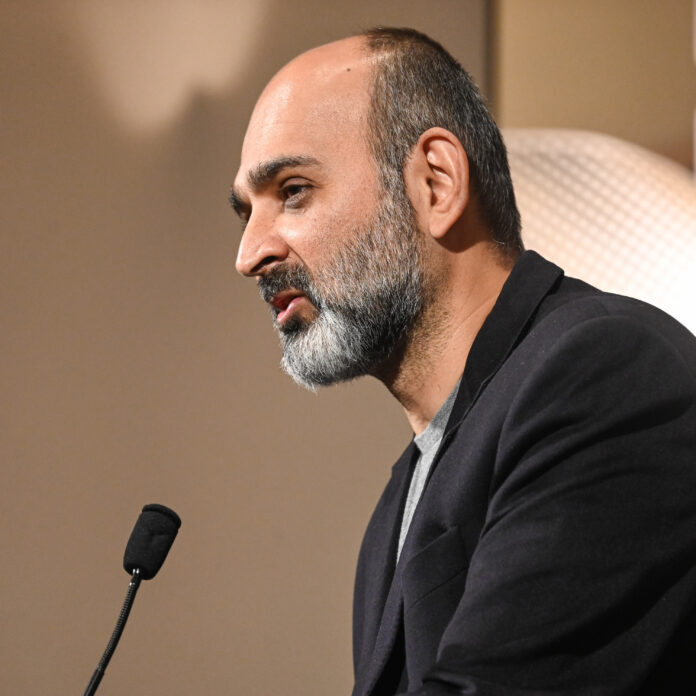
Mohsin Hamid, a British-Pakistani novelist and author of “Exit West,” visited campus on Tuesday, Apr. 11, to give a public reading, talk and book-signing. The event was hosted by the English department and the Center for Ethics. This year’s theme for the Center for Ethics is Speculative Futures, incorporating many events, including a film series and culminating in Hamid’s talk. He spoke to students, faculty and community members in Miller Forum about his fourth novel, “Exit West,” published in 2017.
“Exit West” was first introduced to campus four years ago when Borders, Nationalisms and Identities was the Center for Ethics theme. That fall, the Center for Ethics hosted an Invitation to Conversation with professors Jim Bloom, Ph.D., Ioanna Chatzidimitriou, Ph.D. and Sharon Albert, Ph.D. that discussed this novel in preparation for his initially planned visit in April 2020, which was postponed due to COVID-19. Although the original plan was not fulfilled, Muhlenberg did not abandon it.
The Center for Ethics theme in 2020-2021 was Engaging in Speech and Action, which incorporated “Exit West” as a campus read a second time. A faculty panel discussion analyzing “Exit West” with Hamid, Emanuela Kucik, Ph.D., Dawn Lonsinger, Ph.D., Leticia Robles-Moreno, Ph.D. and Mark Stein, Ph.D. continued the past year’s discussion on Borders, Nationalisms and Identities. While Hamid was scheduled to speak at the College for the following year’s theme (2021-2022) Pandemic: Response, Resilience, Reflection, his visit was again postponed due to COVID-19. Now, “Exit West” returns to relevance as the novel deals with themes of nationalities and borders and imagines a future world where everyone migrates either literally or metaphorically.
At the public talk, Hamid began with an anecdote about not speaking for one month after being frightened when he moved to the United States as a child. He realized through this experience the true fear of being a migrant in a new country and channeled that compassion into writing “Exit West.” He read a passage from the first page, and said that the story is, “about reckoning with the passage of time and migration and to remind us that because we move through time, we are in a way connected to those who move across geographies.”
Creative writing students were also invited to participate in a Q&A with Hamid, hosted by Lonsinger, who got to ask him about his experience as a novelist. Hamid told the students how he learned to make time to write, finding his passion while studying at Princeton University. Hamid was born in Lahore, Pakistan, and moved to the United States at age three with his family when his father was earning his Ph.D. at Stanford University. At 18, Hamid returned to the United States and after graduating college, attended Harvard Law School. He worked in New York City and London and began dedicating more and more time to his writing, until eventually deciding to make it his full-time job.
“I read ‘Exit West’ as an incoming freshman and now have revisited it in my Reading for Writers CUE, and both times I was struck by Hamid’s powerful storytelling and lyric writing.”
Elizabeth Mahony ’23
Students asked about his journey to Muhlenberg that was four years in the making, his writing process and censorship. Hamid said, “The pandemic is a reminder that reality isn’t real,” explaining that recent events, particularly the pandemic, have created a rupture in reality. He said that “‘Exit West’ was at first written as a reaction to migration and the election, and even now, the issue of migration is never going to go away. It speaks to how we talk about where we come from.” He went on to say that humans are the only species that believe borders exist and that “humanity didn’t start in Allentown,” which received a chuckle from the students.
Elizabeth Mahony ‘23, who was at the Q&A, said, “I read ‘Exit West’ as an incoming freshman and now have revisited it in my Reading for Writers CUE, and both times I was struck by Hamid’s powerful storytelling and lyric writing. I really enjoyed both the Q&A and the talk and found them incredibly valuable as a young writer.” Hamid gave the writing students advice: “Give yourself time to write. Write almost every day. When you do, something starts happening.”
“Written literature is not doing the same thing as TV or film. It’s inviting people to play make-believe.”
Mohsin Hamid
Hamid ended by saying, “I wanted to explore what it’s like to leave something behind. For every immigrant, there is an emigrant; there’s somebody who has left their country as well as someone who has come to their country… I thought, I’m going to write a novel that’s about a first love. Stories about first loves are, by their very nature, stories about something beautiful that passes. I wanted to write a novel about letting go… Written literature is not doing the same thing as TV or film. It’s inviting people to play make-believe.”
Alex Caban-Echevarria ’23 is double majoring in media & communication and English. She is the Assistant Editor of the Allentown Voice, a non-profit student journalism lab and a Pro Publica Emerging Reporter for the 2022-2023 academic year.





















